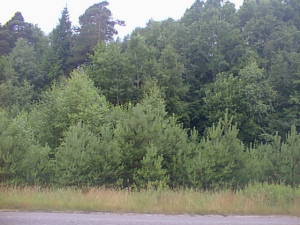Freeday 31 August 2001

|
Pic of the day: The terrain here just invites to stretching the legs a bit. Not that I'm getting stone age levels of exercise, though. Everyday mythsThere are some things that seem so obvious, but still are not true. I came to think of this today, as I prepared to take a walk in the hills here. It is decent exercise for us non-sport types. As I drank a little water, I remember the advice to drink a lot of water before exercising, because you lose water by sweating and this is a major source of discomfort while training. Of course, this sound advice is pretty much worthless if you don't know when to drink that water. ***The human digestion is not some black box into which you just put the stuff and the useful parts are miraculously absorbed, if all goes well. There are some basic design features that are useful to know. Such as the stomach, a sack which stores and dissolves food for several hours before sending it onward to the intestines. The actual time depends on several factors, most notably the contents of the meal, the size of the meal, and how long you habitually go between meal. The longest time is for large meals with lots of fat, and when you usually go long between meals. The stomach is not very complex, structurally. It is the same sack for all of the food, and the water. There is no way for the water to bypass the rest of the contents. So if you've eaten a decent meal within the last few hours, the water you drink will remain in your stomach until the meal is finished. It would make sense for the stomach to be a main area for absorbing water, since water does not need to go through a long process of digestion. But actually it's the large intestines that are the main water absorber. And the food doesn't arrive there until several hours after it leaves the stomach again. So drinking a decent quantity of water regularly, and especially with the meals, is far more useful than downing a gallon of the stuff just before exercising. Perhaps someone should have mentioned that too, instead of just say "drink water before exercise". And generally, eating a large meal before any physical exertion is a bad idea. Blood will flow to your digestion rather than your muscles, unless you are angry or scared. And being angry and scared is not good for your digestion, or indeed any other part of you. So the advice should be to eat little in the last hours before training, except perhaps a bit of sugar and starches, and drink water regularly. After training, carbohydrates are a good idea. If you've worked hard for a while, the muscles and liver will have emptied part of their glycogen reserves (animal starch), and you should rebuild these. They are a nifty feature and should be encouraged. Proteins, however, are not burned during physical training, contrary to popular belief. Proteins are broken down if they are not needed, or if there is not enough carbohydrates. The burning of protein creates various toxic residues that must be eliminated through the kidneys, unlike fat and carbohydrates which burn completely to CO2 and water. For this reason, it makes no sense to eat more protein than you need. Protein supplements (or cheese, which does the same trick) are only necessary if you are bulking up rapidly, for instance regaining your muscles after a prolonged sickness or going from couch potato to active sportsman. Finally, cholesterol and fatty acid skyrocket after a fat meal, and remain high for days (unless you have "low-cholesterole genes"). However, after half an hour or so of aerobic exercise, the levels go down and remain low for a couple days or until the next fatty meal. So eating a good heaping of pork with bernaise just after running will negate that health benefit entirely. It is better to do the running after the big meal is digested, and then stay with leaner fare for a while. ***One dangerous mythconception is that our ancestors lived off big animals that the males hunted and dragged home to the cave. This myth probably became popular because it justified the gender roles of its time, but it is dangerous for quite another reason. It makes people believe that it is normal, even necessary to base their diet largely on meat. This is just plain wrong. Unless you're an Inuit or some such, your stone age ancestors probably subsided on fruit and berries, grains and nuts, roots and tubers and edible leaves. The protein supplement varied from larvae and eggs to fish and small animals hunted near the dwellings. Near the coast, sea snails and shells were also eaten. Yes, large animals were eaten, and even hunted. But they were extras. When you use the same cave for a few hundred years, those big bones can really fill up, and they remain almost unchanged for thousands of years until found by some cave digger. In contrast, berries and cabbage are rotted away within days. Quite apart from the fact that those foodstuffs are eaten, not left on the floor or just outside like bones. Meat is rich in fat and proteins, and has certainly been a welcome addition at all times. Even today, most people like meat. But there is no need to encourage daily servings of meat. We are not natural carnivores, but are designed for a more mixed diet. And with today's more sedate lifestyle, the high energy density of meat is a drawback rather than an advantage. An epidemy of obesity sweeps the world, and the least thing we need is to believe that this is somehow "natural". Another sad example that words may indeed hurt you - if you believe them. |
Mostly cloudy. |
Yesterday <-- This month --> Tomorrow?
One year ago
Two years ago